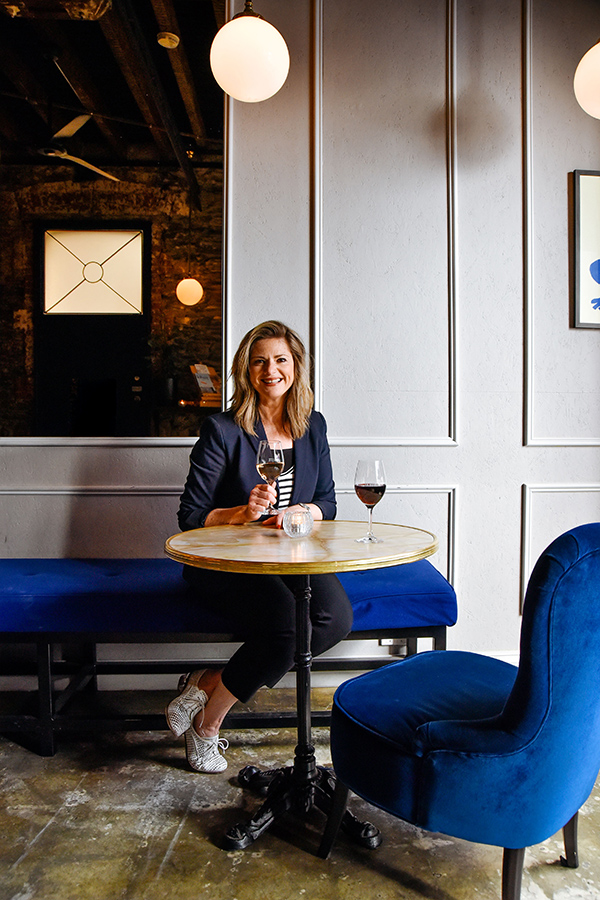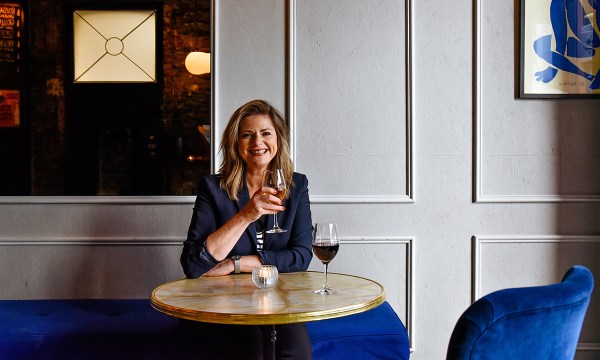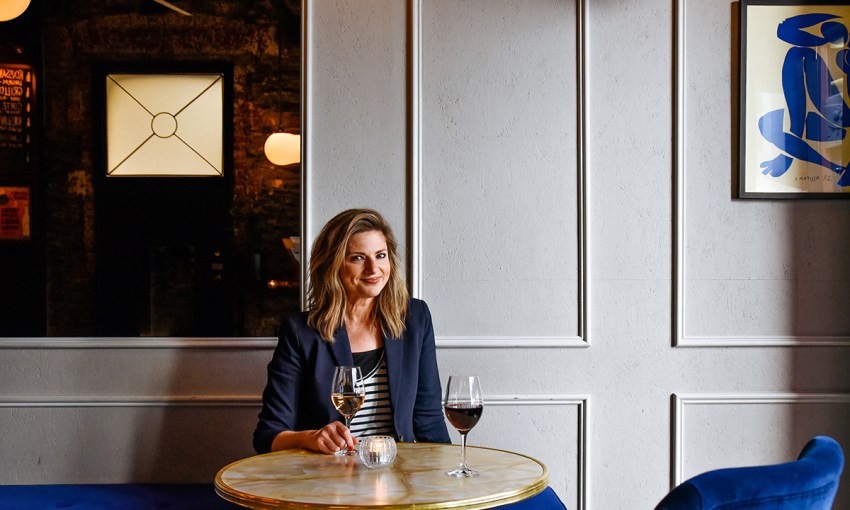A bittersweet conversation between our publisher and the artistic director of the Cabaret Festival, wherein the pair discuss everything from dangerous ideas in Australian culture through to what café she reckons does the best flat white in Adelaide.
That one time we had a glass of wine with Julia Zemiro before lockdown
It was a warm day at the end of November last year when we caught up with artistic director of the Adelaide Cabaret Festival, Julia Zemiro.
Back then, the warmth was nothing more than the usual signal of the impending relaxation December brings and our summer holidays ahead.
Adelaide Cabaret Festival has just announced its 2020 digital program, in response to COVID-19, happening from 5—20 June.
For more information, see the website.
We ordered a glass of wine each and discussed the upcoming program for the Cabaret Festival in 2020 and all manner of topics beyond. Talking with Julia is easy and we quickly understand why she’s had such a successful career in entertainment. She made us snort laugh before we’d even sat down.
However, this conversation took place before catastrophic bushfires ravaged our communities in the Adelaide Hills and Kangaroo Island and gouged a great black scar across our entire country. This chat took place in a context when summer and heat needed nothing more than a cold beer or cool wine as relief.
Looking back on the chat we had with Julia Zemiro at La Buvette on Gresham Street, the simple clink of our glasses we recorded at the top of this interview makes us melancholy.
This interview is a moment in time, a capsule of conversation from an era now foreign to all. It feels like a bomb’s gone off since then and it’s at precisely this point, where we should introduce the artistic director of Adelaide’s famous Cabaret Festival.

Q&A With Julia Zemiro
CityMag: How much time have we got? Half an hour?
Cabaret Festival: Not quite. Can you make it 20 minutes?
Well, that will be plenty Julia. You’re a quick talker.
Julia Zemiro: I’m such a quick talker.
Sign of intelligence I hear too. The quicker you speak, the more people absorb is what I’ve heard.
Is it that? Or is it a sign of an egotist? Because they’re always talking and you’re like, ‘Can you shush, so I can get a word in?’ Oh, is that what a conversation is?
20 years of Cabaret Festival.
I know!
We’re here in this beautiful French-styled bar in a backstreet of Adelaide. A great spot for this interview, but where were you drinking when you were 20?
Where was I drinking… good question! Oh my god. I am going to say I was at Sydney University, Manning Bar. Doing lots of fantastic plays, not really doing my course. Not really finishing my Bachelor of Arts (which I never finished) and I did heaps of drama, which wasn’t even on the curriculum and I would have been drinking a beer.
I hadn’t hit wine yet and I was still trying to do beer at 20. I was a late bloomer, doing heaps of drama – totally getting the bug – discovered it’s what I wanted to do, thinking about auditioning for acting schools and trying to learn how to drink a schooner of beer.
The reason I ask is because I feel like there’s been so much change in the culture of ‘going out’ in Australia that its important we actually talk about art in the context of ‘going out’, you know?
What are some of the changes to Australian culture you’ve experienced since your time trying to drink a beer at the Manning Bar?
There’s no doubt we’ve changed. I actually think this [points to the phone on the table between us] has changed. Social media, having a phone. You know, it was a time that if you had to sit down in this bar and you were alone, you couldn’t just get on the phone to give you something to do – you had to interact with the person next to you. You could not not interact.
The whole thing with phones is that you can go somewhere, not know anyone, and feel like you’re relaxed in your own little world and you don’t need to push out anymore. Socialising was literally about reaching out – having the courage, maybe a little Dutch courage…
Cigarettes helped too…
I absolutely started smoking at university in that very bar, because it gave me something to do as well as read my book.
As well as not look like a weirdo by yourself.
Totally.
This is not an ad for cigarettes!
Totally! No, it’s not – but it was the reality. Now, phones are the new cigarettes.
So that’s a big change. Before you had to reach out and talk to someone and ask, ‘Where are you going? Are you going there? Okay, well I go to that bar too,’ or ‘I’ll go and watch that band as well.’ I think the other big thing that’s changed is there’s so much entertainment, so how do I get people to come to the Cabaret Festival? The other big thing that’s changed is Netflix. I love Netflix as much as the next person, but you could go down a rabbit hole of stuff and never leave your house.
You could never do that before. You still had to eat – no one was going to bring you food like they do now. Now we walk less, we go out less, we phone it in, and then how do I convince people to go out in winter and enjoy themselves? All I can hope for is that people still want to hang out together and see stuff.
Well that’s the role of art surely?
I think so, and the lovely thing about Cabaret, too, is that people tend to get dressed up. It’s winter, they wear something wonderful. They want to be seen and they want to show off a bit, and for that I’m forever grateful. People love doing it and so do I.

Whenever I think about Australian culture, I really do think of The Late Show and Full Frontal – you were a cast member on Totally Full Frontal – and how un-PC it was. Now we’re living in this very tight and very “inclusive” discourse about society that doesn’t always allow people to be wrong, make mistakes, learn and grow an appreciation of what diversity and identity means, not just to individuals, but our entire nation.
How’s entertainment changed in 20 years?
I still think one of the great things about cabaret – and any art form – is you can still say what you want to say and you might be judged for it, but there should still be a space for you to be able to say something. The beauty of cabaret is that no one’s filming it. It’s not necessarily going to go viral – you can still talk about dangerous ideas… which, by the way there are now festivals called, ‘Dangerous Ideas’ because we need to let people know, ‘we’re about to talk about a dangerous idea everyone. Don’t panic!’
I went and saw Pussy Riot at Edinburgh Festival last year and then they came out here to Adelaide. And there is still something dangerous about that group, because you know what they’ve been through.
I may not understand everything they’re saying, I may need to rely on the surtitles or the subtitles or whatever, but they’ve lived something quite dangerous that you’ve not had to live. So you might not agree with everything they say, but they’re alive still and they’re still doing things and making noise. I feel like with cabaret, there’s still a place to be out there, to be a character, to be naughty, to talk politics. I think it’s the perfect place to talk about what’s happening around us.
Yes, by all means go there to forget, but also go there to wake up!
We’ve got a bit of a French connection going on with the 2020 program and your own life. Your father was a French restaurateur and yourself born in France.
Yes, we came out [to Australia] when I was two.
We didn’t go to France often, because we couldn’t afford it. We went back once, and we brought back vinyl. There was no spotify, you had to bring back music in its physical form. When I got this gig I think everyone thought, ‘She’ll do heaps of French stuff.’ In 2019, the balls just didn’t land. People we wanted weren’t free, shows weren’t available, and this year it’s all come together for 2020.
You’ve spent a bit of time in Adelaide now. Do you have any favourite places you find yourself returning to other than La Buvette?
It’s such a crazy busy time when I’m here that I’m the sort of person who gets up in the morning and goes for a walk along the river, gets some fresh air. I always go to… Bonobo?
Yeah! On Bank Street?
I always go to Bonobo, get a coffee because he’s open really early.
They won our North Western Coffee Championship for 2019.
If I say to him, ‘double shot flat white.’ He gives me that! And if I say, ‘not too full’ – he does it. And it’s hot. And it’s hot enough for me to be able to walk back to my hotel, get back into my room and sip it in bed. I’m a bit naughty that way.
There’s a Japanese restaurant I get taken to a lot when we’re here.
Shōbōsho?
I think that might be it. It’s near here. And they make this raw tuna salad with edamame beans that you always go, ‘One? Can we not have two?’
Adelaide just has space to do stuff.
Compared to Melbourne?
And Sydney. I do live in Sydney now. I moved there to be closer to my parents. There’s just an ease to be able to do things here and it’s not mental. It’s restful here. It’s really nice.
What are you looking forward to about 2020?
You know, it’s a real privilege to get this gig. I don’t take it lightly. You’re being charged with choosing and creating three weeks of entertainment. It’s your choice. That’s not to be taken lightly. You’re using other people’s funds and money.
You’re giving jobs to, sometimes, friends. You’re sometimes not giving jobs to friends. It’s a real balance. And last year, just as I felt like things were getting tense and it was a bit, ‘What’s going on?’ the thing was on. And once it starts, that’s where you see the fruit of all the labour. The emails, the negotiations, the back and forth and all of a sudden the thing comes together and you get to see what you’ve been talking about for months. Meeting them, seeing other artists meet each other. It’s so cool. And I think it’s exciting for audiences, but remember that for artists this festival is a way for them to make connections, swap numbers, collaborate.
I reckon a lot of performers – not just in cabaret – would say, ‘I met that person in Adelaide.’ Be it at the Adelaide Festival, be it at WOMAD, or the Cabaret Festival, ‘We met in Adelaide’ is what I’ve heard so many say. And of course they did.
And because it’s so relaxed. It’s becoming very European in that way. When people come here they’ve got time to relax and be together, they hang out. You shouldn’t underestimate that. And also I feel the responsibility of the 20th anniversary. It’s a big deal.
It’s nice they gave you a year to warm up.
(Laughs) I don’t think I even knew I was going to be involved in the 20th when I signed on. ‘Oh, it’s the 20th? Oh okay’ (gulps).
So yeah. It’s been very exciting. We have a huge whiteboard in the office and you see all the things in different colours. When it goes to black it means it’s locked in. When it’s still in purple its at another stage, blue – not quite there. Then they disappear entirely, and come right back again. You have to hang on quite lightly.
You might want someone, but do you know how many festivals and things are going on around the world? It’s hard. Oh my god it’s hard. There’s a festival for every day of the year, somewhere in the world. So when you get your people and you’ve got them it feels great.




